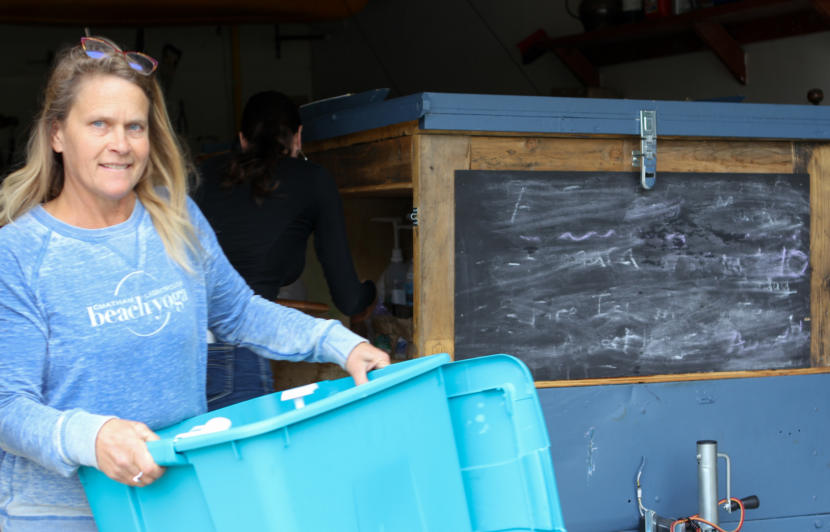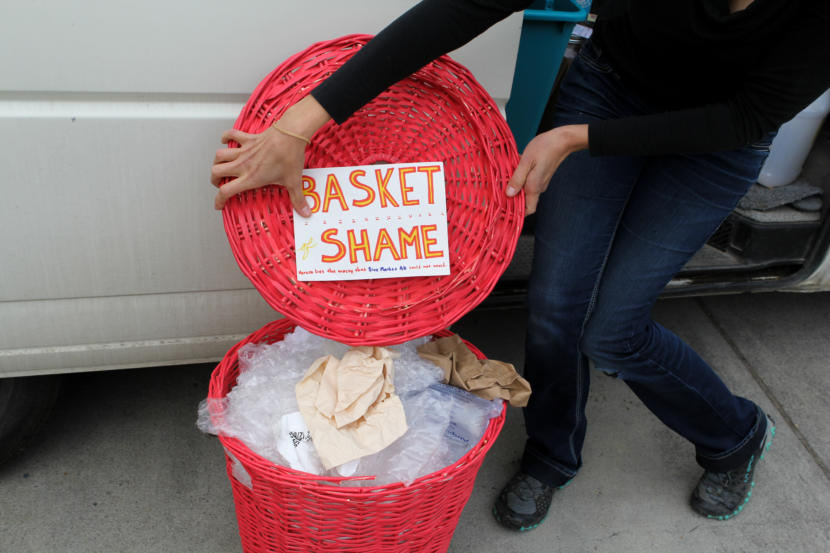
Jennifer Gordon hasn’t quite figured out the right word to describe her new business venture.
“‘Refillery’ is a word people have used a lot,” Gordon said.
As in, a place to refill your shopping needs. Gordon is one-half of Blue Market AK, an operation that, right now, is physically housed in a refurbished wooden trailer cart parked in a garage and towed around to area farmers markets.
Just as Anchorage is preparing to ban plastic bags from local retail, the new venture is trying to go a step further: eliminate packaging waste altogether.
Right now, Blue Market is doing that by selling shampoo, Mason jar accessories and other sustainable-minded dry goods from the cart. But it aims to set up a permanent store selling locally-made products, food and general goods that incorporate sustainability at every level.

On a recent weekday, Gordon and her business partner Jessica Johnson were getting the cart prepped to haul over to a nearby farmers market. On one side were several big jugs of shampoo with dispenser pumps on top. Most of these products are locally made in Alaska. Customers bring their own glass jars or reusable plastic bottles, pump shampoo in, then pay by the ounce.
Their ambition, Johnson explained, is to expand into a brick-and-mortar store selling primarily locally-made products stripped of unnecessary, disposable packaging material — even sticky, liquid, viscous products shoppers may never have encountered except inside a plastic bottle.
“We’re going to have olive oil and honey and vanilla, and we hope to have all of that on tap so you can refill just about anything,” Johnson said.
As the two women have hauled the Blue Market cart to farmers markets across Anchorage this summer, a lot of their work so far is about getting customers acquainted with a different conception of shopping.
“It’s either educating, or it’s re-educating,” Gordon said, noting that decades ago plenty of stores sold bulk goods that were not prepackaged. “It’s remembering that it happened before and how it works.”
“For other people, this is a totally new concept,” she added.
It wasn’t that long ago when Alaska was significantly more commercially isolated and its residents were better-acquainted with basic conservation practices, which often entailed liberally reusing or repurposing items when the situation called for it.
Besides squirts of locally-made shampoo, the women sell durable products to replace more ubiquitous disposable ones. For example, they offer cloth sandwich containers and locally-sourced beeswax wraps for transporting food, in lieu of plastic Ziploc bags.
As she began thinking about how to cut out single-use plastics, Johnson said she inventoried all the disposable items in her daily habits and replaced them: reusable bags stuffed into her purse, a stainless steel straw.
“I carry a spork in a little zipper bag,” she said.
The two women say they are not anti-plastic, they are anti-waste.

Gordon recommends that people structure a challenge for themselves to begin phasing out disposable items. That’s what she did when she posted to Facebook about trying to go a month without using disposable plastics, noting when she inevitably hit snags.
She’s noticed there’s one particularly tricky modern convenience to eliminate: paper towels.
“I told my family, I said, ‘We are not buying paper towels anymore, and you better not buy them either,’” she laughed.
Gordon is experimenting with taking her family’s old T-shirts, cutting them up for rags and using them as a paper towel substitute. Which has rankled her teenage daughter.
“I’m like, ‘Well, sorry, it’s a rag now. And that’s what we do with rags. We wash off the counter,’” she said.
The business partners hope that the city’s pending ban on disposable plastic bags will spur residents to get a little more mindful about their broader consumer habits. That means taking the three R’s of sustainability — reduce, reuse, recycle — and adding one more: refuse.
“The very first thing is, refuse the plastic in the first place. If you can’t do that, then reduce it. Use less,” Gordon said. “The last thing is recycle. We need to turn our concept upside-down. ‘Oh I recycle everything, so it’s OK.’ Recycling is great, but it’s the last thing.”
That is particularly true for Alaskans, she added, because of how limited the recycling options are. Many items are exported out-of-state for processing, a trip that involves burning nonrenewable fossil fuels.
Gordon and Johnson want Blue Market to move into a permanent site in the months ahead. Regulations on selling some of the local items are tricky, but one of their hopes is to give local growers and makers a place to sell items once the summer-season farmers markets wrap up.
